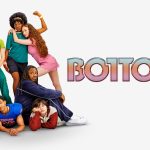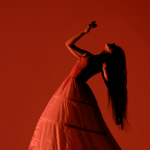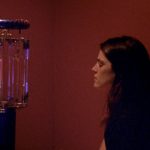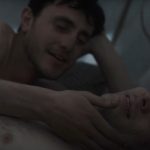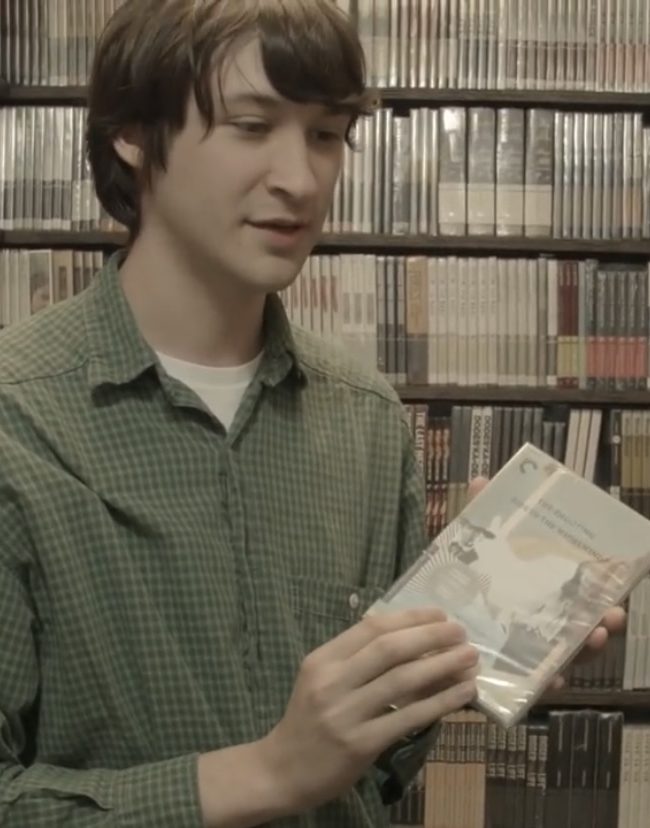A Conversation with Callie Hernandez & Courtney Stephens (INVENTION)
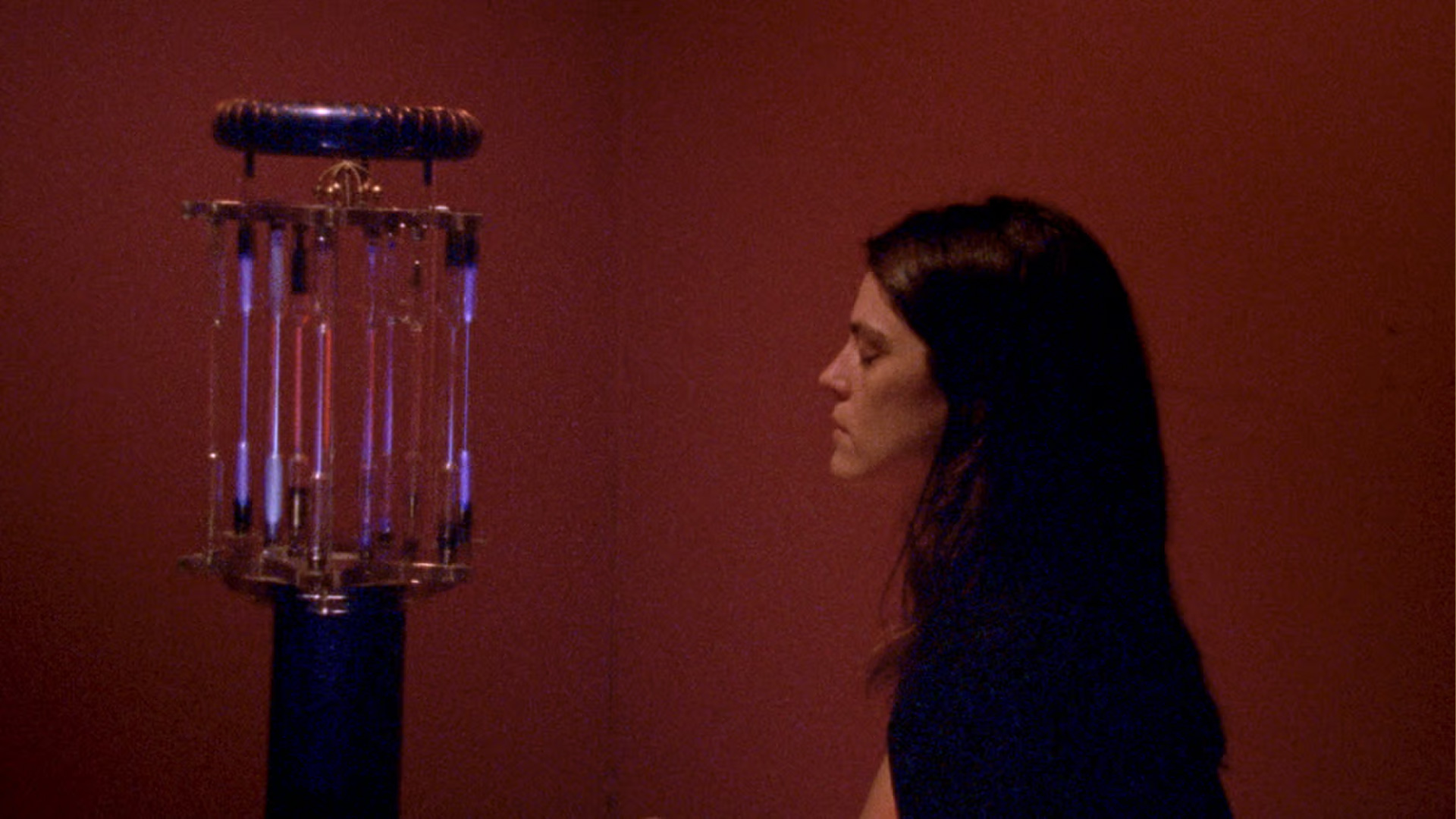
How does the process of grief help us understand a person better? Can we tell who a person was from the things they leave behind? These are some of the questions that director/co-writer Courtney Stephens (Terra Femme) and actor/co-writer Callie Hernandez raise in their ambitious, experimental drama, Invention. The two co-conceived the film together as they were working through their own stages of grief. For Hernandez, she drew upon her relationship with her late father, a medical doctor who dabbled in alternative medicine and appeared on local talk shows in the ‘90s and ‘00s. It was shot on location in the Berkshires, where Hernandez rented a home to produce microbudget films under her Neurotika Haus banner.
Shot on 16mm, the film shifts between loosely scripted scenes, archival footage, and behind-the-scenes audio, cultivating a striking hybrid that defies categorization and blurs the lines between narrative & nonfiction. In a nuanced and poignant performance, Hernandez plays a version of herself named Carrie Fernandez, who discovers her late eccentric father left her a patent for a vibrational healing machine that looks like something straight out of a sci-fi movie. As Carrie tries to learn more about the life her father led, she encounters some of his friends and associates (featuring appearances by directors Joe Swanberg, Caveh Zahedi, and James N. Kienitz Wilkins), leading her down a road where she becomes more vulnerable to the feelings she tries to avoid. With its overall vintage aesthetic, layered performances, astonishing editing, and the right amount of ambiguity, Invention is an intriguingly distinct observation of grief in a post-truth America that pushes the bounds of conventional narrative.
I had the pleasure of sitting down with Stephens and Hernandez to discuss the making of their unique film, now streaming exclusively on MUBI.
[This conversation has been edited for length and clarity]
Hammer To Nail: This film has been on quite a journey. You premiered it last year at Locarno, and this year you brought it coast-to-coast from New Directors/New Films to the Los Angeles Festival of Movies. How was your experience bringing this story to audiences all over?
Callie Hernandez: It’s been amazing. Kind of stunning. The film has been playing overseas for a while now, and I think it’s played very differently here because it’s now a different time. But it’s been really fun, and I’ll let Courtney speak for a lot of this interview because I don’t want to lose my voice [laughs].
Courtney Stevens: It’s been incredible. It’s funny because we’ve seen the film many times, so we were gonna just make sure the sound levels were good and then leave during the first screening. We were in L.A. first, before the New Directors, and we stayed there for about 10 minutes because, from the start, people were laughing. People may laugh in different places, but with American audiences, the real subterranean currents were strong. So that was exciting.
CH: It seemed to hit home because Courtney and I looked at each other with immediate laughter! Immediate! That hadn’t quite, to my knowledge, happened exactly that way, so that was a very good indicator that something new was being experienced.
HtN: Okay, now I have to see it with a crowd after hearing that.
CS: [Laughs] We hope people can feel permission to laugh.
HtN: Both of you talked about how deeply personal making this film has been, especially in terms of grief. How did this project evolve through your shared experiences and conversations?
CS: It was exactly like that, through conversations and experiences. We’ve known each other for like 10 years through other friends, and we ran into each other in New York. It was pretty soon after Callie lost her dad, maybe six months, and over the next year, we saw each other, hung out, and talked about not just grief, but like the particularities of daughters losing fathers. That is a very particular kind of grief. Also, depending on the kind of father you had, the complexity of his role, etc. I think grief and fathers were at the core. We started kicking around ideas for a more fictional movie. There were other versions of this film that were more like a thriller, but it came together as a combination of ideas that we were shooting back and forth. There’s something really organic about how things – I don’t like that word, but there was something about the conditions of filming that were also dictated by location, as well as extras and actors.
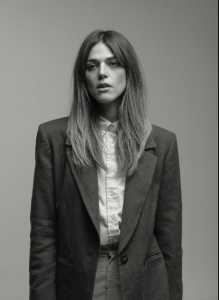
Filmmaker//actor Callie Hernandez
CH: I don’t want to be redundant, but I had finished shooting an HBO show, and I felt something in the ether was not gonna keep going the way that it was going in film. Like, some big cinematic shift was gonna happen. So, I decided to rent this house, and I thought, “I’m just going to make as many micro-budget films as I possibly can in a year in this rented house.” I really had no plan. I spent the winter by myself, wondering what I was doing and why I was there. But then, a year later, two shorts and two features were made. I think within the six-month mark of losing my dad, I already had it in my mind that I wanted to make these films, and I reconnected with Courtney at that point. I felt that, as the daughter of someone very complicated, also losing him, formulating this film in particular felt like a medium for not just ideas but also for grief. Once we were shooting, lots of things were coming through in this way that I don’t think either of us could have ever expected. When my dad died, his estate was in shambles, and he had left so many of these types of electromagnetic helium machines. He was very into lasers. There were particular artifacts that I felt drawn to in a certain way. My dad’s tapes were all in one place, which was shocking. Once I showed them to Courtney, there seemed to be enough shared interests and shared feelings there that it was like, “Okay, maybe this is the film.”
HtN: So, did your dad actually invent the wellness machine that’s in the film?
CH: My dad wasn’t an inventor. Well, I guess he was an inventor in a different way. He had a line of vitamins and a million ideas all the time. He was just a doctor. He was an MD, and he worked in the ER for 10 years. In the early ‘90s, he started his own holistic healing business, which initially focused on Chinese medicine, then transitioned to hypnotism, and later to Reiki, then to more energetic healing, and eventually to the use of machines. He really got buried in machines.
HtN: What’s really distinct about this film is that it plays as an unconventional experimental narrative interwoven with all these little bits of documentary in between. Would both of you define this film as a hybrid of fiction and documentary?
CS: In the nicest way possible, we don’t care how it’s defined [laughs]. It’s played in documentary festivals, and it’s always kind of funny to us and maybe to audience members as well. Sometimes I think of it as this kind of scrapbook of its own of the making of the film, and the making had a certain energy in it. That energy was real. It was coming from real emotional places. This is true about any film; it’s kind of a record of its own manifestation. There’s a version of the film without any behind-the-scenes audio, and even without the archive, it would just be a story drawn from different aspects of life. But, I think this idea that the effort to create the film also came out from the same instinct to go a little bit sideways to look back at a thing that’s hard to look back at directly. There are ways we can think in grander ways of grief, that when you’re in your own grief, it’s very personal and hyper-specific. Fictionalizing it a little bit kind of allowed a different perspective.
CH: There is just more comfort with investigation because it depersonalizes it. We can look at it a little clearly. I’ve had to learn to allow people to categorize it however they want. I would feel differently, maybe if it wasn’t by dad’s face. There are certain aspects of the film that are so specific to me, and some that are so specific to Courtney. So I had to really learn how to allow it to be what it’s going to be.
CS: I think we like sharing what’s true and what’s not, even though the ambiguity in the film is maybe nice for an audience member who comes in knowing nothing.
CH: Yeah, there was no doubt in my mind that we were making an ambiguous film. There’s no way to know what people are going to attach themselves to. The story of my dad was something I was hesitant to share for a really long time. I was vehemently opposed to putting it in. He died from COVID, so I didn’t want to put that in the film; otherwise, it would’ve been about something else, other than being able to look at it like a painting or something a little more ambiguous. It’s an ever-changing, very alive thing, the process and the reception.
HtN: The character of Carrie doesn’t seem to understand her father a lot. But this journey she goes on is pretty profound because she tries to piece together who he was, not just from the machine he invented, but also those who knew him, even the briefest. Callie, how was it for you navigating this character’s journey? How much of it mirrored your own?

A still from INVENTION
CH: I didn’t really approach this as an actor because I didn’t have the time to. If I did approach it that way, I would have done a million things differently. But we were basically the crew. We were running sound, we were gaffing, we loaded magazines of film, we were doing a million different things. It was only four of us: me, Courtney, our DP [Rafael Palacio Illingworth], and sound. So, due to the nature of how the film came about from deep collaboration between me and Courtney, I really approached it more as a filmmaker. Once the camera was up, we were shooting these scenes, which we talked about for months and months and months. As a performer, I felt very intuitively that the character of Carrie was an observer more than anything else. The person who was her father is now gone. So I would say that this is a little true to my experience, and I would say that probably Courtney had a similar experience, like anyone who loses a parent. You may start to gather memories from different perspectives. You want as many reflective qualities of that person as you possibly can. It may not even be that you’re searching for the kernel of truth; you’re just looking for new aspects to keep alive in a certain way.
HtN: That’s a really good way of putting it. What was your impression of your dad’s professional life? Was there a moment of bewildered discovery like the one Carrie makes at the beginning of the film?
CH: I haven’t talked about this, but as a kid, we moved like nine times before I was in the third grade. We were always moving around, and I never really totally understood why. I remember going to school, it must have been in first grade, back in Texas, and somebody asked, “What does your dad do?” At that point, he was running a full-on hypnosis center. So I said that my dad’s a hypnotist, and then that kid looked at me like I had nine heads. I went home and I asked, “Mom, is that weird?” [Laughs] My baby sister and I had very different feelings and approaches about it. I would say I was a little skeptical growing up. But after my dad passed, I think what was the most enlightening was finding out how much, as my dad’s children, my sister and I had very different experiences with him growing up. We were sort of experiments as children in the medical field. I think that was one thing that was pretty shocking at that point. That was something that kind of clicked.
HtN: Courtney, you’ve worked in both narrative and documentary before this film. How did your creative approach change for this project, as you were pretty much balancing both genres in a way?
CS: It changed completely in the sense of what was happening on set and in terms of working with the actors. I was learning a lot in that domain. I made a lot of films that are about ideas more than sentiment. It was interesting learning about how fiction holds ideas, and how ideas can resonate in the background of a film without detracting from the actual stakes of what we’re trying to think through. The film is about grief and the nature of it. There may be certain aspects that make it feel more like a critique of health culture and maybe a commentary on COVID. We were clear that we did not want that to be the takeaway, but rather that those things are there in all of our lives, even in the personal realms of our lives.
HtN: The 16mm cinematography really helps establish the mood of the film. Can you talk about working with your DP, Rafael Palacio Illingworth? How did you decide to shoot on this format?
CS: Rafael is a director himself and has shot many of his own films. This was actually his first film being a DP for someone. I think it was his wish to shoot on film. We were thinking a lot about kinds of fantasy spaces, and being in spaces where you take the kind of contents of the real and then reassemble them differently, or make a puzzle out of them. So it felt like acknowledging the cinematic as the kind of place where we’re doing that. There were these other realms as the place that we’re drawing from, which was this archive of an earlier time in America. We were holding these things in the air and doing a little bit of playing with them in this sort of 16mm world. It felt useful just to have that distinction of when we’re in the film and when we’re kind of in the past.
HtN: Not to make this conversion political, but the topics of healthcare and American capitalism are quite prevalent in the film. Could you share your own thoughts on capitalism and the direction of health care in America?
CH: What can you say? The proof is that it’s happening right now. We’ve talked a lot about things as a response to hopelessness, to the feeling of it. That’s probably the most articulate I could possibly be about capitalism.
CS: I think the cruelties of the medical system in the US give birth to all kinds of doubt and suspicion, which is apt. We’re also dealing with a for-profit medical system in large part. It’s just absolutely horrendous, and it should not be the case. It leads to a different set of values than the value of human life. All of those things and the stratification of access to medicine have given birth to versions of alternative health that are actually survival strategies. A lot of these critiques of medicine are deserved. I think we wanted to have empathy for medicine, but also question where doubt around medical truths comes from. Some of these doubts and alternate routes I might even subscribe to. But again, I think what our film is trying to say is that this is the ocean we’re swimming in right now, and there’s a reason that it’s on the top of our minds. So many things in the film are in the news now.
– M.J. O’Toole (@mj_otoole93)

